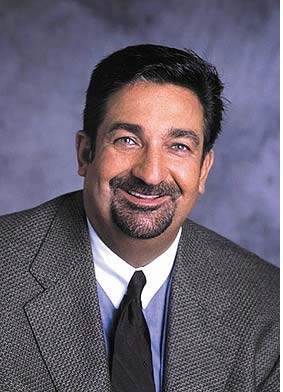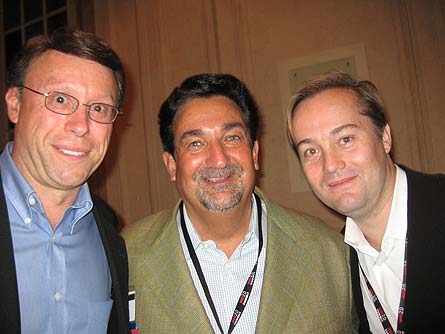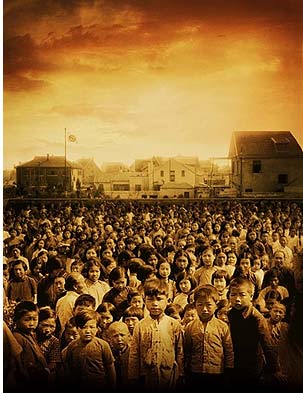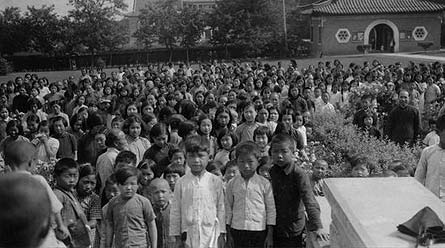AOL visionary Ted Leonsis on his new filmanthropy
 Ted Leonsis cried when he premiered his film Nanking last year at the Sundance Film Festival. That’s because he had bankrolled the film, traveled to China to research it, had selected the director and actors, and even helped edit it. And now he was finally seeing the credits roll on a “Film by Ted Leonsis.”
Ted Leonsis cried when he premiered his film Nanking last year at the Sundance Film Festival. That’s because he had bankrolled the film, traveled to China to research it, had selected the director and actors, and even helped edit it. And now he was finally seeing the credits roll on a “Film by Ted Leonsis.”
"It really hit me," he told the Washington Post. "It's the first time that I can't believe I had an idea, and now we're in a movie theater watching a movie I made."
Nanking is the harrowing account of the rapes and murders of 300,000 Chinese civilians and soldiers in the city of Nanking in 1937 and '38 and the idea for it began in an improbable place: Leonsis’ yacht. He was cruising the Caribbean a couple of years ago when he noticed a newspaper obituary on Iris Chang, the author of "The Rape of Nanking," a best-seller about the Japanese atrocities in the city. He read the book, and then he pulled out his checkbook.
“It's got Germany. It's got Japan. It's got an invasion that had terrible consequences to the Chinese people, and it's a story that hasn't been told," said the 51-year-old Leonsis, an AOL vice chairman and owner of the Washington Capitals hockey team, who liked the story because he said the horrific tale is also about ordinary people who do extraordinary things. The movie's heroes include a Nazi businessman, and a collection of Westerners who stayed behind and built a safe zone that sheltered more than 200,000 Chinese. Woody Harrelson and Mariel Hemingway are among the actors who helped narrate and recreate the story. And the family of American physician Robert Wilson, a real-life hero of the tragedy, attended the premiere and thanked Leonsis and his staff after the movie.

“The risk is that we don't execute it well enough that the goodness doesn't seep out," said Leonsis.
He’s proud of the finished film, though, and he now considers it a “filmanthropy" model to use in making future films with a social message.
"It's where you can shed light on a big issue. You raise the money around your charity and make something that can drive people to understand an issue," he said. "It brings together philanthropy and understanding how media works. You're going to see a lot of people doing this because a studio probably wouldn't do a story like this."
To make the film, Leonsis formed his own production company, Agape, and both his wife, Lynn, and son, Zach, worked on the project. "It's a tough, important movie to watch," Leonsis said. "But it's uplifting stuff. This is 'Schindler's List' with a Chinese twist. This movie, if marketed right, could be like a 'Passion of the Christ.'
His larger ambition is to make Agape the vehicle to spotlight other human rights stories. "This story is so rich, so life-altering with human rights, political, religion, ordinary people as heroes, I know there are other big stories out there that have these same qualities," he said.
 It’s part of the big vision that is Leonsis’ make-up. A kid from Brooklyn, he once had a teacher tell his parents: “I don’t think Ted is college material.” To prove her wrong, when his parents moved back to Lowell, Massachusetts, where they had lived before he was born, Leonsis drove a forklift at night and worked in a dress factory by day, sold shoes on Wisconsin Avenue, and bagged groceries at the Demoulas Market. “My destiny was to bag groceries, move up to cashier, then manager of the produce department, then, if I really worked hard, I would get to manage a store.”
It’s part of the big vision that is Leonsis’ make-up. A kid from Brooklyn, he once had a teacher tell his parents: “I don’t think Ted is college material.” To prove her wrong, when his parents moved back to Lowell, Massachusetts, where they had lived before he was born, Leonsis drove a forklift at night and worked in a dress factory by day, sold shoes on Wisconsin Avenue, and bagged groceries at the Demoulas Market. “My destiny was to bag groceries, move up to cashier, then manager of the produce department, then, if I really worked hard, I would get to manage a store.”
Instead he graduated Georgetown University, and after college he worked in the public relations department at Wang Labs and there found his calling: “Ted is an interesting guy, a curious guy, a bright guy,” said John Cunningham, who worked with him at Wang. “He loves the limelight, more so than most people.”
His instinct for marketing led him to start Redgate Communications, which put catalogues on CD-ROMs, but the company had some cliff-hangers, as in the winter of 1988, when it didn’t have enough money to meet its payroll. His wife Lynn was pregnant with their first child, around the same time his mother died, and it was at the funeral that Leonsis realized he might also lose his company.
“I don’t think Christmas is going to be too good, Ted,” one company executive told him, “We’ve got $7 in our corporate checking account.”
“I had 30 seconds of self-pity,” Leonsis said.
He mortgaged some land the couple owned in Florida, then he called an investor and borrowed $500,000. (That investor, said Leonsis, “made like $40 million on his investment.”) By 1994, the company had 120 people on the payroll and billings of $70 million a year, which is when Steve Case and AOL came calling. AOL bought Redgate and Leonsis became an executive and later president of AOL.
“How do I get office furniture?” Leonsis asked on his first day. “Work late,” Case answered him.
At AOL, Leonsis became the “visionary” and marketing whiz, running the company’s online service, and heading AOL Studios, which developed the company’s Internet shows and original programming. Before the Time Warner merger, he also headed the instant messaging service ICQ, and the movie listing and ticketing service MovieFone.
“This is a great time to be alive,” the burly, bearded Leonsis admitted at the time of the hurly-burly of his business life, but he also compiled a personal two-page list of “101 Things to Do” after suffering a scare in 1983 when a flight he was traveling on nearly crash-landed. “I don’t want to die,” he remembered thinking. “I told myself that if I live, I’m going to play offense.”

He’s since checked off most of the items on his to-do list (including doing stand-up comedy, catching a foul ball off Mookie Wilson at the Mets training camp, and giving to charity and his alma mater: “I’m the youngest person in the school’s history to give a million bucks”). Said AOL Time Warner head Steve Case, “He’s blasting right through them. He wants to live life fully. He sets targets and he achieves them.”
“I want to hand out copies at my funeral and have people say, ‘I was with him when he did Number 12,’” said Leonsis. He said others have made their own lists and “they call me to brag about it.”
Top items on his list related to sports (he played intramural basketball and street hockey) and No. 65 was to own a sports franchise, which he ticked off when he bought the Washington Capitals and a minority share in a sports conglomerate that owned the Washington Wizards basketball team and brought in Michael Jordan as a minority partner and president of basketball operations.
“This is great,” Leonsis boasted at a hockey game as the newly-minted team owner (though mostly he’s soft-spoken and professorial and only has the give-away New England twang). “This is what I want.”
“I’m only scared of what I don’t know,” he once said, and he borrows a quote: “The best way to predict the future is to invent it.”